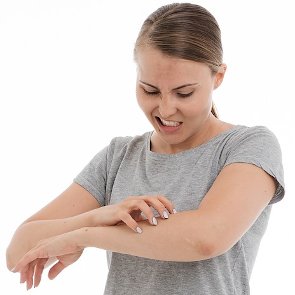5 Potential Allergens That Can Be Found in Cosmetics
 A lot of cosmetic ingredients might cause various kinds of allergic reactions, from slight irritation to atopic dermatitis. They’re not necessarily inherently harmful; it’s just that some people are more sensitive to certain ingredients than others. Here’s a list of potential allergens that you should be aware of if you have sensitive skin.
A lot of cosmetic ingredients might cause various kinds of allergic reactions, from slight irritation to atopic dermatitis. They’re not necessarily inherently harmful; it’s just that some people are more sensitive to certain ingredients than others. Here’s a list of potential allergens that you should be aware of if you have sensitive skin.Fragrance
Most cosmetic products, except for those labeled “fragrance-free” or “unscented”, contain some kind of fragrance because consumers usually want their cosmetics to smell nice. They are typically listed as “fragrance” or “parfum” (although some manufacturers include aromatic compounds on the ingredient list, such as citronellol, hydroxycitronellal, geraniol, linalool, limonene, citral, benzyl salicylate, etc.).
Fragrances used in cosmetics, personal care products and household chemicals can contain several dozen aromatic compounds, some of which may cause allergic reactions. And we don’t necessarily mean synthetic fragrances; many people are allergic to all-natural essential oils that are widely used as fragrance in natural and organic cosmetics.
If you have sensitive skin, you should be careful with cosmetic products that contain fragrance (i.e. most cosmetic products) and maybe even consider switching to fragrance-free cosmetics.
Check this out: 4 Best Essential Oil Combinations (In Our Humble Opinion)
Lanolin
Lanolin is a wax derived from sheep wool. It is used extensively in cosmetics due to its emollient and occlusive properties; lanolin locks in moisture and helps protect the skin from the environment. Lanolin has a complex composition that includes an estimated 8,000 to 20,000 different types of esters, which makes it very hard to determine which of its constituents are the cause of allergic reactions. Besides, different manufacturers use different purification techniques in the production of lanolin. This explains why some products with lanolin cause allergic reactions while others don’t.
If your skin isn’t particularly sensitive, products with highly purified lanolin are probably safe for you. Common lanolin alternatives for people with sensitive skin are highly purified petrolatum and carrier oils (coconut oil, shea butter, cocoa butter, etc.).
Check this out: What Is the Difference Between Emollients, Humectants and Occlusives?
Urea
Urea, also known as carbamide, is a highly effective humectant and emollient. Urea-containing creams are widely used to treat dry, rough, itchy and flaky skin, as well as some skin conditions, such as eczema, psoriasis, dermatitis and keratosis. However, research has shown that urea can be irritating to skin. The Cosmetic Ingredient Review (CIR) has proven that urea is safe for use in cosmetics and personal care products in low concentrations. So, the bottom line is that skincare products with urea are generally not allergenic, but there is a microscopic chance that they might be.
Check this out: 5 Ingredients to Avoid in Moisturizers
Propylene Glycol
Propylene glycol is an organic compound that is commonly used in cosmetics as a solvent. It is essentially non-irritating to the skin; the CIR has deemed it safe to use at concentrations up to 50%. However, they have also found out that people with damaged skin barrier have a higher risk of getting irritation or an allergic reaction even at low concentrations of propylene glycol. If you have ever had allergic reactions to cosmetics, you should probably stay away from this ingredient.
Check this out: How to Take Care of Sensitive, Acne-Prone Skin
Plant Extracts and Essential Oils
Plant-based ingredients aren’t so harmless as some natural and organic brands claim. Most plant extracts and essential oils have a complex composition and may cause sensibilization, irritation and even allergic contact dermatitis in sensitive consumers. Tea tree, peppermint, henna, citrus fruit, lemongrass, lavender, clove, eucalyptus, and ylang-ylang are all listed among potential allergens that are likely to cause skin reactions.
Check this out: Botanical Ingredients in Cosmetics and Their Benefits
Breadcrumbs
Filters
- Face, Body, Hair
Tags
Related Articles
- 5 Things That Can Make Your Hair Color Fade, 5 Makeup Products That You Don’t Actually Need, 5 Skincare Products That You Don’t Actually Need, 5 Pairs of Skincare Ingredients That Work Well Together